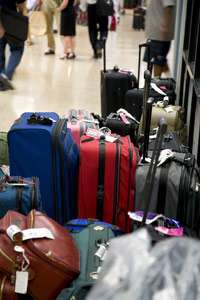All-in-one computerized scheduling will make airports greener, more efficient

A new computerised approach to airport operations is being developed that will reduce delays, speed up baggage handling and decrease pollution.
The project is funded by the Engineering and Physical Sciences Research Council (EPSRC) and led by researchers at The University of Nottingham.
The research work aims to computerise and co-ordinate four key areas of airport operations: scheduling of aeroplanes taking-off and landing, gate assignment and baggage handling. The end result will be a prototype search engine capable of analysing the many billions of possible scheduling combinations so as to provide the best advice to the controllers, who decide where in the airport to send planes.
Currently these four aspects of airport operations are, in most cases, organised manually by highly skilled staff making decisions based on observations, reports and their experience. Furthermore, each activity is run in isolation from the others, which allows the potential for any difficulties in operations in one area to affect another. This can lead to delays snowballing.
As well as enhancing the experience for passengers, crucially, the improvements in scheduling will reduce pollution by minimising the time planes are on the ground with engines running. This could save thousands of litres of aviation fuel every year, a vital improvement given the growth in air travel predicted in the coming years.
A consortium of researchers from four universities are involved in the project, assisted by Manchester and Zurich Airports which will provide crucial advice and expertise from the user's point of view.
The project will see development of computational models for each of the four airport operations which, ultimately, will be run on regular PCs. Key to the research will be examining how to run them all together to streamline overall operations.
Principal investigator on the project and Dean of the Faculty of Science at The University of Nottingham, Professor Edmund Burke, says the limitations of the current systems are widely acknowledged: "Many people in the industry recognise that automating just one of these aspects could improve the efficient running of airport operations, so integrating all four would be a huge step forward."
"We'll be developing a computer system that will work its way through the many billions of permutations created daily in each of these operations, to provide a much higher level of computer-aided decision support than is currently available," says Burke. This will provide the best possible advice to runway controllers and other airport staff to inform their decisions regarding where planes and baggage are moved to.
Among the crucial issues being tackled is the matter of how long an aeroplane needs for preparation on the ground before take off. This has to include enough time for the passenger safety briefing, which is a legal requirement, and for the engines to warm up. If sent to the runway without incorporating enough time for these activities, it will mean a delay at the runway before take off. This can lead to unnecessary congestion on the runway, aircraft unnecessarily using up fuel while waiting for take off, and, potentially, delays to other flights.
Burke adds that the involvement of the two airports will also provide invaluable assistance to the multi-disciplinary team of scientists and engineers: "Working closely with Manchester and Zurich airports will ensure access to real world expertise that should help us achieve the best possible result."
The academic team in the consortium consists of representatives from: The University of Nottingham, University of Salford, Loughborough University and University of Liverpool.
Source: Engineering and Physical Sciences Research Council (news : web)
















